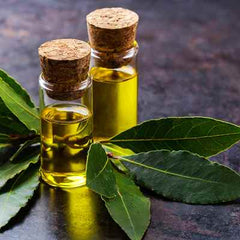Bay Laurel, Laurus nobilis, also known as sweet bay, is an evergreen tree or small tree shrub that is part of the laurel family and is native to the Mediterranean. The bay laurel leaf is the "bay leaf" that is used in cooking.
According to Greek mythology, the nymph Daphne was transformed into a laurel tree by her father in order to escape the unwanted affections of the god Apollo. Since Apollo could not have her as his wife he took the bay laurel tree as his emblem. In ancient times it was believed that the bay laurel tree held magical powers, warding off evil witchcraft and disease.
The essential oil is extracted from the leaves by steam distillation. The oil has a strong, spicy, herbaceous, and sometimes medicinal scent that may differ depending on the region in which it is grown. For example, the oil produced from trees in Italy or France has the scent we associate with the bay leaves used in cooking. While the oil produced from North African varieties has a more pungent aroma reminiscent of eucalyptus.
The essential oil of bay laurel is quite strong and must always be diluted in order to prevent skin irritation. When mixed with carrier oil it can be used topically as a remedy for aching muscles and joints and sprains. Bay leaves contain astringent, antimicrobial, and antifungal properties.
Due to its astringent properties, bay leaf oil is a nice addition to facial toners. When used topically Bay Leaf oil is soothing to the skin and can help reduce the appearance of blemishes and promote a more clear complexion.
In hair care, the oil is also considered to be a good tonic to stimulate hair growth and remove dandruff.
Aromatherapy Properties: The scent of Bay Laurel, a lovely blend of camphorous and spicy notes together with softer sweet, fruity and floral notes, emits an uplifting aroma that promotes peace of mind, and confidence and encourages creativity and inspiration. It helps promote feelings of confidence and enhances focus when dealing with challenges.
Note: Bay Essential Oil (Pimenta racemosa) and Bay Laurel Essential Oil (Laurus nobilis) are sometimes confused with one another since their common names are similar. Although they do share some broad similarities, they are very different essential oils.
Pregnancy and Children: We do not provide information on the safety of essential oils during Pregnancy or for use in Children because the available information is very ambiguous and often contradictory. If you’re interested in using essential oils during pregnancy or with young children please do your own research and consult your doctor, midwife, or health care professional before use.
Precautions: If you are pregnant, nursing, taking medication, have a medical condition, or have any medical concerns regarding yourself or your family consult a qualified, licensed health professional prior to use. For external use only. Keep away from eyes and mucous membranes. Keep out of reach of children.






